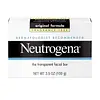What's inside
What's inside
 Key Ingredients
Key Ingredients

 Benefits
Benefits

 Concerns
Concerns

 Ingredients Side-by-side
Ingredients Side-by-side

Triethanolamine
BufferingTea-Stearate
CleansingGlycerin
HumectantSodium Tallowate
CleansingWater
Skin ConditioningSodium Cocoate
CleansingSodium Ricinoleate
CleansingSodium Oleate
CleansingCocamide Mea
EmulsifyingDisodium Cocoamphodiacetate
CleansingSodium Stearate
CleansingBHT
AntioxidantTocopheryl Acetate
AntioxidantTetrasodium Etidronate
Emulsion StabilisingTrisodium Hedta
Sodium Metabisulfite
AntioxidantTriethanolamine
BufferingTea-Stearate
CleansingSodium Tallowate
CleansingGlycerin
HumectantTea-Lauryl Sulfate
CleansingSodium Cocoate
CleansingWater
Skin ConditioningSodium Ricinoleate
CleansingSodium Oleate
CleansingCetyl Acetate
EmollientCocamide Mea
EmulsifyingParfum
MaskingSodium Stearate
CleansingAcetylated Lanolin Alcohol
EmollientBHT
AntioxidantTocopheryl Acetate
AntioxidantTetrasodium Etidronate
Emulsion StabilisingTrisodium Hedta
Sodium Metabisulfite
AntioxidantTriethanolamine, Tea-Stearate, Sodium Tallowate, Glycerin, Tea-Lauryl Sulfate, Sodium Cocoate, Water, Sodium Ricinoleate, Sodium Oleate, Cetyl Acetate, Cocamide Mea, Parfum, Sodium Stearate, Acetylated Lanolin Alcohol, BHT, Tocopheryl Acetate, Tetrasodium Etidronate, Trisodium Hedta, Sodium Metabisulfite
 Reviews
Reviews

Ingredients Explained
These ingredients are found in both products.
Ingredients higher up in an ingredient list are typically present in a larger amount.
BHT is a synthetic antioxidant and preservative.
As an antioxidant, it helps your body fight off free-radicals. Free-radicals are molecules that may damage your skin cells.
As a preservative, it is used to stabilize products and prevent them from degrading. Specifically, BHT prevents degradation from oxidation.
The concerns related to BHT come from oral studies; this ingredient is currently allowed for use by both the FDA and EU.
However, it was recently restricted for use in the UK as of April 2024.
Learn more about BHTWe don't have a description for Cocamide Mea yet.
Glycerin is already naturally found in your skin. It helps moisturize and protect your skin.
A study from 2016 found glycerin to be more effective as a humectant than AHAs and hyaluronic acid.
As a humectant, it helps the skin stay hydrated by pulling moisture to your skin. The low molecular weight of glycerin allows it to pull moisture into the deeper layers of your skin.
Hydrated skin improves your skin barrier; Your skin barrier helps protect against irritants and bacteria.
Glycerin has also been found to have antimicrobial and antiviral properties. Due to these properties, glycerin is often used in wound and burn treatments.
In cosmetics, glycerin is usually derived from plants such as soybean or palm. However, it can also be sourced from animals, such as tallow or animal fat.
This ingredient is organic, colorless, odorless, and non-toxic.
Glycerin is the name for this ingredient in American English. British English uses Glycerol/Glycerine.
Learn more about GlycerinSodium Cocoate can be bad for dry skin.
Sodium metabisulfite is also known as Sodium Pyrosulfite. It is a preservative, antioxidant, and disinfectant.
As a preservative, it helps stabilize cosmetic formulas without affecting their color or scent.
We don't have a description for Sodium Oleate yet.
We don't have a description for Sodium Ricinoleate yet.
Sodium stearate is the sodium salt of stearic acid.
The structure of sodium stearate makes it both a cleanser and emulsifier. As a cleanser, it helps dissolve dirt, oil, and other pollutants. As an emulsifier, it helps prevent ingredients from separating. This adds stability to the formula.
This ingredient is made from sodium hydroxide (caustic soda) and animal fat. It is not vegan.
Tea-Stearate gets its name from being the (TEA/triethanolamine) salt of stearic acid. It is a brown, waxy solid with emulsifying and cleansing properties.
CHEM: Stearic acid, compound with 2,2',2''-nitrilotriethanol (1:1)
We don't have a description for Tetrasodium Etidronate yet.
Tocopheryl Acetate is AKA Vitamin E. It is an antioxidant and protects your skin from free radicals. Free radicals damage the skin by breaking down collagen.
One study found using Tocopheryl Acetate with Vitamin C decreased the number of sunburned cells.
Tocopheryl Acetate is commonly found in both skincare and dietary supplements.
Learn more about Tocopheryl AcetateTriethanolamine is an emulsifier and pH adjuster. It is created using ethylene oxide and ammonia. This gives Triethanolamine a nitrogen core and a similar scent to ammonia.
As an emulsifier, it prevents ingredients from separating and enhances texture by adding volume to a product.
PH adjusters are common in cosmetic products. The pH of a product can affect the effectiveness of other ingredients. A product with a high pH may also irritate the skin.
Learn more about TriethanolamineWe don't have a description for Trisodium Hedta yet.
Water. It's the most common cosmetic ingredient of all. You'll usually see it at the top of ingredient lists, meaning that it makes up the largest part of the product.
So why is it so popular? Water most often acts as a solvent - this means that it helps dissolve other ingredients into the formulation.
You'll also recognize water as that liquid we all need to stay alive. If you see this, drink a glass of water. Stay hydrated!
Learn more about Water